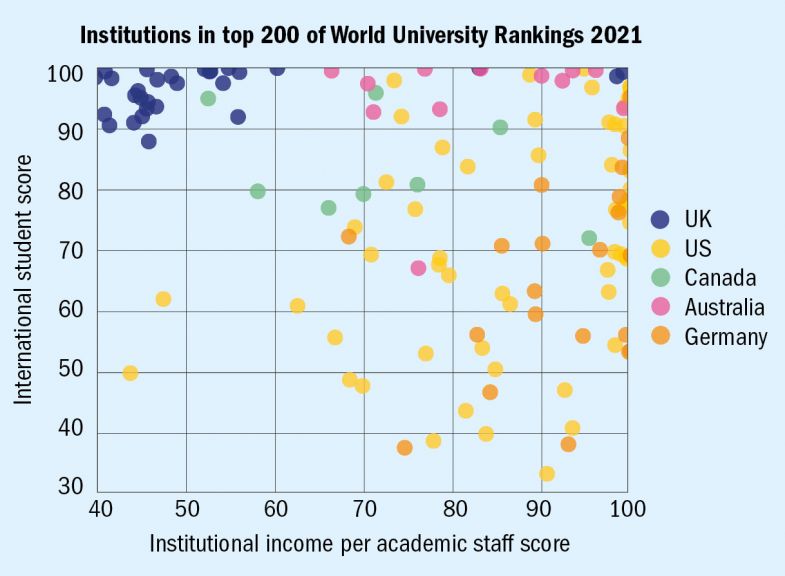Browse the full results of the World University Rankings 2021
Many of the world’s top higher education institutions are especially vulnerable to a downturn in international student mobility, according to data from the latest Times Higher Education World University Rankings.
Although the data reflect pre-pandemic figures, they suggest that several universities in the UK in particular could suffer from a drop in international student traffic, alongside a smaller number of institutions from other anglophone nations such as Canada, the US and Australia.
The data show a number of institutions with high scores for their international intakes yet with relatively low marks on overall income.
Twenty-four UK universities in the top 200 have a score for institutional income per academic staff below 60 but a score for international student share above 90. Of the institutions in the US, Australia and Canada with an international student score above 90, nine have an income score below 80.
Meanwhile, all but two German universities in the top 200 have an income score above 80, and only one scores above 90 for international students.

Higher education experts said that the pandemic could spark a rethink among some universities about the nature and purpose of internationalisation.
Ellen Hazelkorn, professor emeritus in higher education policy at Technological University Dublin, said the pandemic “has exposed the dangers of overdependence on any particular revenue stream”.
Yet it was unclear if this threat would spur universities to move away from relying on international students in the future given that there was often “no automatic alternative” income source, she said.
However, she added, wider trends in student mobility accelerated by the pandemic might lead to “a rethink of internationalisation, placing greater emphasis on cultural and intellectual exchange and collaboration rather than seeing international students simply as ‘cash cows’”.
Laura Rumbley, associate director, knowledge development and research, at the European Association for International Education, said she would “like to imagine” that the pandemic would prompt “very important questions and conversations about all the other things that internationalisation can and should mean for our societies, beyond financial benefit”.
But “whether local or national audiences are ready to engage in this kind of discussion is another story”, she said, adding that it might take careful conversations with politicians and the public to build a consensus on why all aspects of internationalisation in universities – and not just student recruitment from abroad – were important.
Vulnerability to the vicissitudes of tuition fee income from international students also raises questions about whether systems will reassess the funding of higher education more generally.
Hans de Wit, director of the Centre for International Higher Education at Boston College, said although it was far too early to tell, “it is indeed likely that countries with a strong public higher education sector, a good reputation and an economy with good reserves – like Germany, but also other north-western European countries and Canada – will be in a less vulnerable position, as they are less dependent on local and international tuition fees and other sources of private funding”.
Frank Ziegele, director of Germany’s Centre for Higher Education, said higher education in Germany had benefited from a “very favourable” political landscape that has seen increased investment, while the country’s excellence initiative was also a major financial boost for the most research-intensive institutions.
However, he also pointed out that “as we run into enormous deficits of public budgets now because of the crisis, the financial issue will also reach the German universities, but it will happen later”.
POSTSCRIPT:
Print headline: Fee fall: UK unis vulnerable to student mobility drop
Register to continue
Why register?
- Registration is free and only takes a moment
- Once registered, you can read 3 articles a month
- Sign up for our newsletter
Subscribe
Or subscribe for unlimited access to:
- Unlimited access to news, views, insights & reviews
- Digital editions
- Digital access to THE’s university and college rankings analysis
Already registered or a current subscriber? Login








